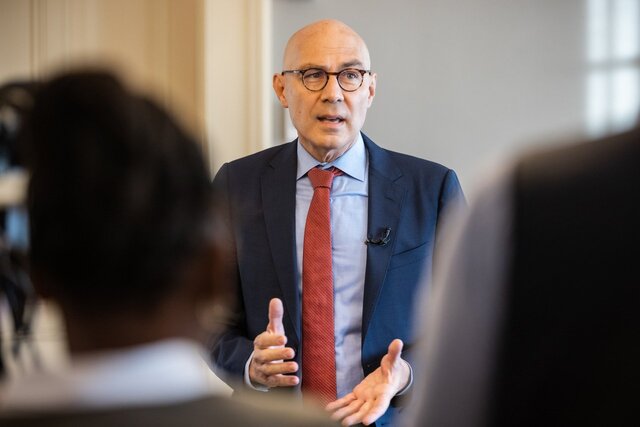Geneva – The UN rights chief urged Iran on Thursday to immediately halt violence against protesters, as countries debated whether to launch an investigation into Tehran’s deadly crackdown.
Volker Turk opened an emergency session of the UN Human Rights Council, where countries were called to discuss Iran’s “deteriorating human rights situation” and determine if a high-level international investigation is warranted.
The meeting, requested by Germany and Iceland with the backing of more than 50 countries, follows two months of protests in Iran sparked by the death of 22-year-old Mahsa Amini, after she was arrested for an alleged breach of the country’s strict dress rules for women based on Islamic sharia law.
“I call on the authorities immediately to stop using violence and harassment against peaceful protesters,” said Turk, the United Nations’ high commissioner for human rights.
ALSO READ | Iran protests enter third month with deadly clashes
“The unnecessary and disproportionate use of force must come to an end,” he said, warning that Iran was in “a full-fledged human rights crisis.”
“Accountability is a key ingredient of the pursuit of justice for human rights violations,” he told the 47-member council, urging the body to vote in favour of an investigation.
Iranian authorities have grown increasingly heavy-handed in their response, as the demonstrations have spread across the country and swelled into a broad movement against the theocracy that has ruled Iran since 1979.
Turk said more than 300 people had been killed since Amini’s death. Norway-based group Iran Human Rights has put the toll above 400, including more than 50 children.
“The security forces… have used live ammunition, birdshot and other metal pellets, tear gas and batons,” said Turk.
‘Shine a spotlight’
He also said around 14 000 people, including children, have been arrested in the context of the protests, describing this as “a staggering number”.
At least six people have so far been sentenced to death in connection with the protests.
Diplomats were asked Thursday to decide whether to establish a so-called independent international fact-finding mission into all abuses connected with the ongoing protests.
The investigation should include “the gender dimensions of such violations”, according to the draft resolution, presented by Germany and Iceland.
The text calls for the investigators to “collect, consolidate and analyse evidence of such violations, and to preserve evidence,” with a view to future prosecution.
German Foreign Minister Annalena Baerbock, who like her Icelandic counterpart attended the session, stressed that “the Iranian demonstrators have no seat at the Human Rights Council in Geneva.”
Before it began, she urged the council to “raise its voice for the indivisible rights of Iran’s people.”
Diplomats and rights activists voiced strong support for the initiative.
“We must do all we can to expose the truth of what is happening inside Iran and support the calls of the Iranian people for justice and accountability,” US ambassador Michele Taylor said.
‘Narrative of tyranny’
Turk said Iranian statements sought “to delegitimise and label protesters, civil society actors and journalists as agents of enemies and foreign states.”
“As we have seen throughout history, it’s the typical narrative of tyranny,” he said, encouraging the Iranian leadership to respect fundamental freedoms and engage with citizens about their vision for the country.
“Change is inevitable. The way forward is meaningful reforms,” he stressed.
In response, Khadijeh Karimi, Iran’s deputy of the vice president for women and family affairs, slammed the Western countries that demanded the meeting.
Europe and the United States “lack the moral credibility to preach others on human rights and to request a special session on Iran,” she said.
Germany and Iceland received broad backing for their request to hold Thursday’s session, including from more than a third of the council’s 47 members.
Western diplomats voiced cautious optimism that the resolution would go through but acknowledged it could be tight.
Baerbock called for the council to vote in favour of the resolution.
“We owe it to the victims,” she said. “Every vote counts.”
Follow African Insider on Facebook, Twitter and Instagram
Source: AFP
Picture: Twitter/@volker_turk
For more African news, visit Africaninsider.com


